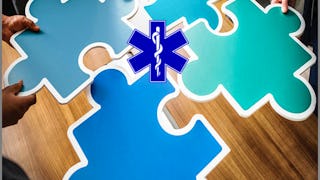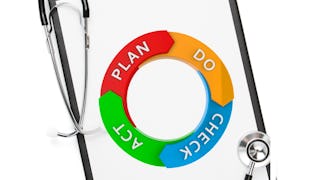This course provides a comprehensive overview of how healthcare organizations function, adapt, and maintain quality and safety in patient care. Learners explore healthcare systems, delivery models, and reimbursement structures. The course covers patient safety standards, resource allocation, and regulatory compliance, emphasizing the nurse’s role in improving efficiency and quality. Students also examine quality improvement processes, professional development, and emergency preparedness in healthcare settings. By the end of this course, learners will understand how healthcare organizations operate, how policies and systems influence patient outcomes, and how nurses contribute to quality, safety, and cost-effective care.



Healthcare Organizations
This course is part of Nursing Leadership Specialization

Instructor: Christy Hennessey (Davidson), DNP, RNC-OB
Access provided by Yale
Recommended experience
What you'll learn
Explain how healthcare systems and delivery models impact patient care.
Identify key regulations, safety standards, and reimbursement systems.
Learn quality improvement principles to enhance healthcare outcomes.
Recognize the nurse’s role in organizational effectiveness and patient safety.
Skills you'll gain
Details to know

Add to your LinkedIn profile
9 assignments
October 2025
See how employees at top companies are mastering in-demand skills

Build your subject-matter expertise
- Learn new concepts from industry experts
- Gain a foundational understanding of a subject or tool
- Develop job-relevant skills with hands-on projects
- Earn a shareable career certificate

There are 3 modules in this course
This module introduces students to the structure, organization, and operational principles of modern healthcare systems. Students will explore issues of access to healthcare and the factors that influence care availability across diverse populations, understanding Diagnosis-Related Groups (DRGs) and their impact on reimbursement and care delivery. The module emphasizes the various levels of care from primary to tertiary settings, principles of resource allocation and utilization that affect healthcare efficiency, and different nursing care delivery systems used to organize patient care. Students will also examine emergency management and preparedness protocols essential for responding to disasters and public health emergencies. Through this exploration, learners will develop a comprehensive understanding of how healthcare systems function, the challenges facing modern healthcare delivery, and the nurse's role in navigating and contributing to effective healthcare organizations.
What's included
6 videos6 readings3 assignments
This module examines the regulatory frameworks and safety principles that ensure quality healthcare delivery and protect patients from harm. Students will explore healthcare regulation and accreditation processes, the role of professional organizations in setting practice standards, and various types of reimbursement systems that influence care delivery. The module emphasizes key principles of patient safety, including standard precautions for infection control, National Patient Safety Goals (NPSG) established by The Joint Commission, and safety considerations across the lifespan from pediatric to geriatric populations. Students will also examine how to foster an organizational culture of safety that encourages error reporting, continuous improvement, and accountability. Through this exploration, learners will develop the knowledge and skills necessary to practice safely within regulatory requirements, contribute to quality improvement initiatives, and advocate for patient safety in healthcare organizations.
What's included
8 videos8 readings3 assignments
This module explores the principles and practices of quality improvement in healthcare settings and the tools used to measure and enhance patient outcomes. Students will examine effective teaching and learning strategies for patient education and professional development, as well as the role of technology and informatics in supporting quality care delivery and data-driven decision-making. The module emphasizes healthcare quality improvement methodologies, including systematic approaches to identifying and addressing gaps in care. Students will learn to interpret healthcare quality measures and quality indicators used to assess organizational performance, patient outcomes, and adherence to evidence-based standards. Through this exploration, learners will develop the competencies necessary to participate in quality improvement initiatives, utilize technology effectively, and contribute to the delivery of high-quality, safe, and efficient patient care.
What's included
5 videos5 readings3 assignments
Earn a career certificate
Add this credential to your LinkedIn profile, resume, or CV. Share it on social media and in your performance review.
Instructor

Offered by
Why people choose Coursera for their career




Explore more from Health

Rutgers the State University of New Jersey

University of Michigan

Rutgers the State University of New Jersey

The George Washington University

